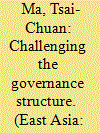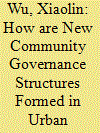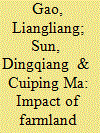| Srl | Item |
| 1 |
ID:
108386


|
|
|
|
|
| Publication |
2011.
|
| Summary/Abstract |
The development of political and economic policies has driven the structure of industry to produce enormous transformations of the political structure in Taiwan. This paper concentrates on foreign policy areas, to demonstrate the long-term dominant influence of structural and institutional constraints upon the state in Taiwan. The analysis concentrates on discussing the interactive structure of the reciprocal penetration between the state and pressure groups, using secondary public and private documents. The investigation shows that the state did not become powerless from the challenges of pressure groups and globalization, but simply generated strategic selectivity and coordination. The investigation of macro from secondary data afford an insight into the different factors involved in shifting the political structure of Taiwan. In addition, we find that the empowering pressure groups also had some resources that the party-state needed. By virtue of spatial interactions, key actors in the governance structure were able to restructuralize the political structure from the earlier Authoritarian regime to the present system of State-corporatism.
|
|
|
|
|
|
|
|
|
|
|
|
|
|
|
|
| 2 |
ID:
144039


|
|
|
|
|
| Summary/Abstract |
After a series of reform and restructuring that aimed to construct balanced market competition since the mid 1990s, China’s telecommunications industry had not developed in the expected way. The market structure remained unbalanced with China Mobile’s dominance. This article attempts to investigate the reasons behind the imbalanced market structure of China’s telecom industry from the perspectives of interactive corporate strategies, structure of intercorporate relationship, and government regulation and institution. It takes into consideration that the reform of China’s telecom industry resulted in a unique tripartite regulatory structure. Thus telecom operators, to some extent, are free to select their own strategy. At the same time, a special intercorporate relationship gradually formed during restructuring. China Mobile simply took advantage of this special regulatory framework and structural relationship by adopting different corporate strategies, and gained dominance in China’s telecom market.
|
|
|
|
|
|
|
|
|
|
|
|
|
|
|
|
| 3 |
ID:
161407


|
|
|
|
|
| Summary/Abstract |
Through interviews and comparison of practices in two Chinese cities, this article argues that local governments are forced to shift some of their excessive responsibilities to new actors. This produces a limited kind of pluralism: government organizations remain in charge of community governance.
|
|
|
|
|
|
|
|
|
|
|
|
|
|
|
|
| 4 |
ID:
164722


|
|
|
|
|
| Summary/Abstract |
There is growing concern that farmland transfers lead to less agricultural investment, which may adversely affect agricultural productivity growth in China. Prior research has primarily focused on the differences between owned cultivated land and rented plots, but little is known about how farmland transfers between relatives, which are popular in rural China, specifically affect agricultural investment. In this paper, we present a conceptual framework of transaction cost economics to compare different contracting strategies in China's farmland rental markets. As farmland rental markets in China are immature, land transfer between relatives establishes bilateral governance, which has the advantage of addressing the opportunistic activities of both parties and can ultimately increase investment by tenants. Based on data from two waves of household surveys, we empirically examine the impact of bilateral governance on the application of organic fertilizer, an indicator for agricultural investment. Our findings show that apart from economic factors, kinship is important to the functioning of farmland rental markets in rural areas.
|
|
|
|
|
|
|
|
|
|
|
|
|
|
|
|